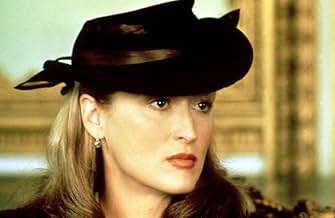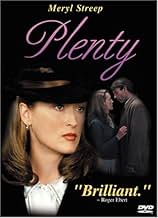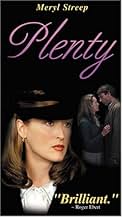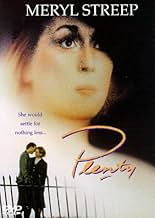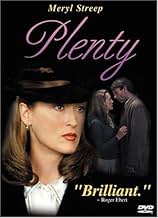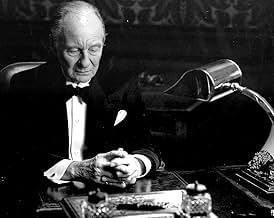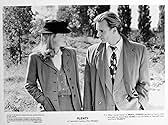NOTE IMDb
6,0/10
3,5 k
MA NOTE
Une jeune Anglaise passe vingt ans à se construire une vie, aux dépens de son entourage, dans l'Angleterre de l'après-guerre.Une jeune Anglaise passe vingt ans à se construire une vie, aux dépens de son entourage, dans l'Angleterre de l'après-guerre.Une jeune Anglaise passe vingt ans à se construire une vie, aux dépens de son entourage, dans l'Angleterre de l'après-guerre.
- Nomination aux 2 BAFTA Awards
- 2 victoires et 5 nominations au total
André Maranne
- Villon
- (as Andre Maranne)
Avis à la une
9RG-5
"Plenty" needs to be seen on a big screen in a theatre; more than most, this is a film that suffers in its translation to a TV screen. (Among other things, there are scenes that are simply ruined in the format change--like the hilarious scene of Streep and Sting on a sofa as Queen Elizabeth's coronation plays live on the tellie!) Sound is also important to fully appreciating the film--like the constant reminders of the sound of opening parachutes that echo throughout the story.
It's easy to understand why the film was not a box office success; it focuses on a woman who is not terribly likeable, but I contend that it is a movie rich in observations that transcend post-war Britain and the borish woman who develops in that milieu. "Plenty" is (among other things) about passion, diplomacy, memory, self-deception and the great expectations that are so easily squashed in our unheroic modern world. The film (and Hare's play before it) revolves around a crucial scene brilliantly played by a startlingly mad Streep and Ian McKellan's icily insightful foreign service officer--well past the film's mid-point. After his long-in-coming dose of reality, Streep's Susan takes a tailspin into the movie's melancholy conclusion. It's not an easy film to "enjoy," but the uniformly brilliant performances from Streep, Charles Dance, Tracy Ullman and John Gielgud make the film fascinating to watch and rewarding to have experienced.
It's easy to understand why the film was not a box office success; it focuses on a woman who is not terribly likeable, but I contend that it is a movie rich in observations that transcend post-war Britain and the borish woman who develops in that milieu. "Plenty" is (among other things) about passion, diplomacy, memory, self-deception and the great expectations that are so easily squashed in our unheroic modern world. The film (and Hare's play before it) revolves around a crucial scene brilliantly played by a startlingly mad Streep and Ian McKellan's icily insightful foreign service officer--well past the film's mid-point. After his long-in-coming dose of reality, Streep's Susan takes a tailspin into the movie's melancholy conclusion. It's not an easy film to "enjoy," but the uniformly brilliant performances from Streep, Charles Dance, Tracy Ullman and John Gielgud make the film fascinating to watch and rewarding to have experienced.
This is a film where you can get lost, wonderfully lost. Following Susan, the character created on the page by David Hare and on the screen by Meryl Streep, is a journey of gloriously unexpected ups and downs. It may be because the amazing Meryl Streep goes trough the analytic intellect of David Hare with her heart on her sleeve and I felt shattered and moved by the access she provided me into the heart and soul of her own personal labyrinth. To look back with regret and feel that memories of fleeting moments of extraordinary beauty can keep you going and see you through whatever hell fate seems determined to throw your way. Meryl Streep never looked this beautiful and the transparency of her missteps are a magic sweep of the most enthralling kind. Irrationaly sane. Like most of the great bipolar. They know, they've seen through. There is nothing ahead only behind and now it's too bloody late. The stages of Susan's journey, to the after war lands of plenty are framed by her own geniality - the character's and the actress's - Susan is overwhelmed by her own awareness, lonelier and lonelier, Meryl overwhelm us with her own sublime generosity. Fred Schepsi, the extraordinary man at the helm, keeps the puzzle open and clear. Like most works of art, not everyone will be ready to open up to this experience. Pretty frustrating let me tell you. I would love to share this experience with everyone.
David Hare's brilliant stage play has been translated beautifully to the screen. The peculiar English trait of natural melancholy radiates throughout this sad exercise of seeing all through the lens of British class consciousness, repression and despair. The color photography, the performances, the stifling framing of the widescreen shots all add to the oppressive beauty of a story about the self-destruction of a preternaturally beautiful woman. Mery Streep has never been better before or since. Hare makes her intellectual acuity a weapon against herself as she sees through all the ghastly pretenses of a corroding Empire. No insight, no beauty of body, no letting go of formality and pretense can save her from herself. Feminism itself is taken to the burning stake as Streep's character thrashes, Hedda Gabbler like, against walls and prohibitions beyond her understanding. Rarely has such condemnation looked so ravishing.
In "Plenty" (***1/2). Meryl Streep gives one of her greatest performances in the complex role of "Susan Traherne", an idealistic young Englishwoman whose compulsive need to stir things up comes in conflict with a crippling lack of courage. We follow her life from her days in the French Resistance at the end of World War II to her professional and emotional decline during the 60's. Her key line: "I want to change the world, but I don't know how." The supporting cast, production and direction are superb, and the score by Bruce Smeaton is hauntingly beautiful. The character functions as both a metaphor for postwar England and a real flesh and blood human being, although it's a flaw that we don't learn more about her family background, apparently an upper class one, which might have contributed more to an understanding of her later, often perverse, behavior. The only two people she seems to have in the world are Charles Dance, playing her long-suffering diplomat husband and Tracy Ullmann, wonderful as her free-spirited best friend, probably the kind of person Susan would like to have been if it were not for her "fatal weakness": she likes "losing control." This film has been newly released in its original Panavision dimension on DVD and looks terrific. Seeing it the way it should be seen only enhances my opinion that it's one of the most underrated movies of the 80's.
This much-overlooked British drama opens with, literally fades in on, her days in WWII France. It follows her through the next 15 or 20 years, and ends with an aching scene from a past day when she thought tomorrow seizes nothing but good things for her. But nothing else in her life is ever as valuable, as dignifying or as exciting as the war. She is, maybe, a little insane. She divulges in one scene that she has a considerable issue: "Sometimes I like to lose control."
Fred Schepisi's obscure film stars Meryl Streep and it is a performance of daring delicacy. It is hard to play an irrational, maladjusted, quasi-suicidal woman with such tenderness or grace. She is oftentimes quite charming to be around for the other characters, and when she is letting herself fall short of restraint, she doesn't do it in the vein of those exclusive movie frenzy scenes but with a relatively pleasant imperativeness.
When she returns to England after the war, she makes friends with a round-faced, grinning imp played by a refreshing Tracey Ullmann. Another is Charles Dance's foreign service officer who is initially charmed by her casual, free-spirited lifestyle, and then marries her and becomes her permanent aggrandizer, putting up a barricade of composure and practically divine patience around her tantrums.
It is challenging to pigeonhole specifically what it is that disturbs Streep's character. Early on, David Hare's screenplay shepherds us to her own heuristic that after the valor and brazenness of the war, after the gallantry and the passion, it is beyond absurd to her to readjust back to normal life and endure the tedious small talk of civil commonality. Yet as the film proceeds in a clandestine manner of being episodic, we find there is something persistent, a little vicious, in the way she humiliates her husband at crucial times, constantly seeking to be tactless and incongruous. Ultimately, we gravitate toward his position when he eventually thunders that she is hateful and pitiless, and oblivious to those who have withstood her.
But then there is an postlude, moistened by the misty twilight of the most dismal hour of fall, and there is such despondence in the way she and another character both become conscious that nothing will ever graze them again the way the war did. This bit part-filled movie is conclusively not a assertion concerning war, or foreign service, or middle-class British, but just the story of this lost woman who at one time lived profoundly, and now finds that she is barely even living.
The performances grant one enthralling solitaire after another. Most of the pivotal instances come as different characters eclipse different scenes. Streep births a complete character around a woman who could have merely been a hit list of problems. Charles Dance has an unrewarding part, as her perpetually agonized husband who from the beginning seems like a very dull bureaucrat, but survives to show that he is respectable as well as foolish. Sting plays a commonplace young man who ineffectively tries to conceive Streep's child for her. John Gielgud has three small scenes and steals them all, which essentially is the story of his career. Plenty is written, acted and directed as a lather of refinement and delicate shrewdness, underneath which grows the revelation that life can often be futile, dull and depressing, and that there can be days, months, years, decades in accordance.
Fred Schepisi's obscure film stars Meryl Streep and it is a performance of daring delicacy. It is hard to play an irrational, maladjusted, quasi-suicidal woman with such tenderness or grace. She is oftentimes quite charming to be around for the other characters, and when she is letting herself fall short of restraint, she doesn't do it in the vein of those exclusive movie frenzy scenes but with a relatively pleasant imperativeness.
When she returns to England after the war, she makes friends with a round-faced, grinning imp played by a refreshing Tracey Ullmann. Another is Charles Dance's foreign service officer who is initially charmed by her casual, free-spirited lifestyle, and then marries her and becomes her permanent aggrandizer, putting up a barricade of composure and practically divine patience around her tantrums.
It is challenging to pigeonhole specifically what it is that disturbs Streep's character. Early on, David Hare's screenplay shepherds us to her own heuristic that after the valor and brazenness of the war, after the gallantry and the passion, it is beyond absurd to her to readjust back to normal life and endure the tedious small talk of civil commonality. Yet as the film proceeds in a clandestine manner of being episodic, we find there is something persistent, a little vicious, in the way she humiliates her husband at crucial times, constantly seeking to be tactless and incongruous. Ultimately, we gravitate toward his position when he eventually thunders that she is hateful and pitiless, and oblivious to those who have withstood her.
But then there is an postlude, moistened by the misty twilight of the most dismal hour of fall, and there is such despondence in the way she and another character both become conscious that nothing will ever graze them again the way the war did. This bit part-filled movie is conclusively not a assertion concerning war, or foreign service, or middle-class British, but just the story of this lost woman who at one time lived profoundly, and now finds that she is barely even living.
The performances grant one enthralling solitaire after another. Most of the pivotal instances come as different characters eclipse different scenes. Streep births a complete character around a woman who could have merely been a hit list of problems. Charles Dance has an unrewarding part, as her perpetually agonized husband who from the beginning seems like a very dull bureaucrat, but survives to show that he is respectable as well as foolish. Sting plays a commonplace young man who ineffectively tries to conceive Streep's child for her. John Gielgud has three small scenes and steals them all, which essentially is the story of his career. Plenty is written, acted and directed as a lather of refinement and delicate shrewdness, underneath which grows the revelation that life can often be futile, dull and depressing, and that there can be days, months, years, decades in accordance.
Le saviez-vous
- AnecdotesThe original Broadway production of "Plenty" by David Hare opened at the Plymouth Theater in New York City on January 6, 1983, and ran for ninety-two performances until it closed on March 27, 1983. The play was nominated for four Tony Awards in 1983, including Best Play. Also, the play won the New York Drama Critics' Circle Award for Best Foreign Play of the 1982 to 1983 season.
- GaffesQueen Elizabeth II's coronation was in 1953, yet the flag display in the background includes the Canadian "maple leaf" flag which was not adopted until 1965.
- Citations
Susan Traherne: I would stop, I would stop, I would stop fucking talking if I ever heard anybody else say anything worth fucking stopping talking for!
- ConnexionsFeatured in At the Movies: Crossover Dreams/Maxie/Mishima/Plenty (1985)
Meilleurs choix
Connectez-vous pour évaluer et suivre la liste de favoris afin de recevoir des recommandations personnalisées
- How long is Plenty?Alimenté par Alexa
Détails
- Date de sortie
- Pays d’origine
- Langue
- Aussi connu sous le nom de
- Eine demanzipierte Frau
- Lieux de tournage
- Sociétés de production
- Voir plus de crédits d'entreprise sur IMDbPro
Box-office
- Budget
- 10 000 000 $US (estimé)
- Montant brut aux États-Unis et au Canada
- 6 148 000 $US
- Week-end de sortie aux États-Unis et au Canada
- 436 266 $US
- 22 sept. 1985
- Montant brut mondial
- 6 148 000 $US
- Durée
- 2h 4min(124 min)
- Couleur
- Mixage
- Rapport de forme
- 2.35 : 1
Contribuer à cette page
Suggérer une modification ou ajouter du contenu manquant


